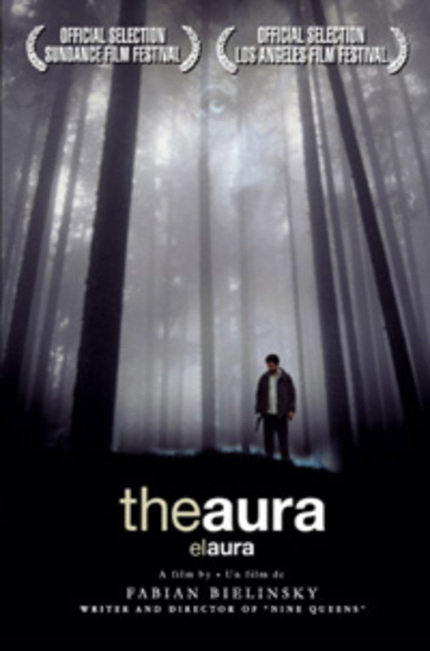DVD Review: El Aura

I had the pleasure of watching El Aura well over a year ago when a young brash festival here in Toronto was pre-screening it to see if it would fit in with their line-up. Sadly, it did not, but I have always kept my eyes and ears open for a local release so I could once again witness this masterly crafted crime thriller again. Seville Pictures released El Aura here in Canada back in August and with numerous festival obligations here in Toronto we've only just caught up with it.
El Aura is a must have for crime thriller movie aficionados. Highly recommended.
"THE AURA (El Aura)" follows the journey of Espinoza, an introverted taxidermist who secretly dreams of executing the perfect robbery. On a hunting trip, in the calm of the Patagonian forest, his dreams are made reality with one squeeze of the trigger.
Espinoza accidentally kills a man who turns out to be a real criminal and becomes heir to his scheme: the heist of an armored van carrying casino profits. Espinoza is eager to carry out the plan, but his inexperience puts him in real danger. Worse yet, he is an epileptic. Before each seizure, he is visited by the "aura"...
We first see Espinoza on the floor of a bank entrance, waking up after a seizure. Living in an empty marriage he’d rather work on his animals than be with his wife. Newspaper clippings of botched criminal acts line his workshop. Apart from his work as a taxidermist he dreams of pulling off the perfect crime, thinking that all he has to do is get the details down pat. He is so busy with the details of these thwarted crimes he is oblivious to his own failing marriage. With nothing keeping him at home he accepts the offer from a colleague to go on a hunting trip in rural Argentina. I should add that this point of the film includes one of the most masterful transition shots I have ever seen; though stationary in the frame we see Espinoza sitting at the end of his bed, to sitting at the airport terminal, to sitting the airplane, to sitting in the jeep as they drive to resort country. It is perfectly executed.
All the hotels in the area are booked for the weekend because the local Casino is closing its doors after the holiday weekend. Espinoza and his colleague are directed to a hunting lodge deep into the country. They meet Diana and Julio, brother and sister, who live at the lodge with her husband Dietrich. They go on their own into the forest and soon split as their strong personalities collide with each others. Espinoza goes further on his own but has a seizure before he can shoot his first deer. No sooner has he woken up from his lapse and he accidentally kills another hunter in the forest. But he discovers the hunter’s cabin and inside on the bench is the plan and details for an intricate heist of the Casinos final profits. Quickly thereafter he finds himself willingly involved in this scheme, believing he can take over the planned heist and pull it off.
What we discover in El Aura is everyone in is fuelled by a need to escape. Like Espinoza, they may need to escape an uneventful and boring life. Like Diana, they may need to escape persecution from an abusive spouse. Like Dietrich, they may need to escape from the punishment of a money launderer. And these relationships are mostly matched up in pairs, one on either side of the moral fence, usually dividing between the criminal and the innocent.
Fabián Bielinsky’s second feature as writer and director is a slow burning crime thriller that is masterly crafted, beautifully shot capturing the beauty of rural Argentina, creating intensively quiet moments as well as dynamic action sequences. El Aura should long be mentioned in the breath as other excellent rural thrillers like Fargo and The Lookout. Bielinsky deftly uses long shots and slow camera movements, only breaking from this style when Espinoza has one of his seizures or when the action picks up. Only then does the camera move quickly to convey heightened emotion and reaction, smartly setting is apart from the developing plan of the heist and the emotional connections between Espinoza and Diana. Sadly, we will never have the pleasure of seeing another work of this caliber from this director again as Bielinsky passed away the following year in the summer of 2006. We’ll never know if Argentina had a rising auteur in their midst.
I have to call out Seville about the special features. Having never been known to pack their releases with extras and features Seville stays true to form and frustrates this reviewer with sub-standard add-ons. The three minute plus ‘making of’ feature is not nearly enough and to provide an interview with the late director in the Spanish language only to subtitle it in French is gravely disappointing. My Spanish is worse than my French and my French ‘n’est pas tres bien’ to begin with. Talk about dropping the ball. Frustrating.







